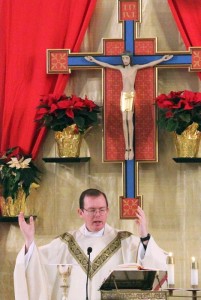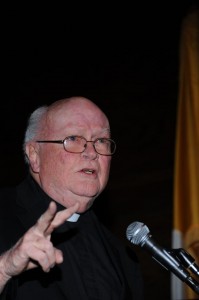
Father David Vidal, I.V.E., is pastor of St. Veronica Parish in Philadelphia and a native of Buenos Aires, Argentina, from which Pope Francis also hails. (Sarah Webb)
The election of a pope is always a time of joy for Catholics. The election of Pope Francis is special. He is the first pope from the Americas, the first Hispanic pope, and in particular the first Argentinean pope.
Locally, Argentineans are thrilled that one of their countrymen is now the Supreme Pontiff.
“All Spanish-speaking people are happy to have a new pope from a Spanish country, a Latin American country,” said Incarnate Word Father David Vidal, pastor of Philadelphia’s St. Veronica Parish and an Argentinean. “I grew up in Buenos Aires, the same city where Pope Francis was archbishop and he certainly was a very devout leader for the people of Buenos Aires.”
Father Vidal especially recalls Pope Francis’ devotion to Our Lady of Lujan, the patroness of Argentina, whose shrine is about 30 miles from the city, to which he would lead pilgrimages.
“He was a very simple man with the people, greeting the masses and being with them,” he said.
“We don’t have many Argentineans in our parish, it’s mostly Puerto Ricans, but we will join in any celebration. I think he will be a wonderful pope.”
[hotblock]
Pope Francis is also unique in that, according to Catholic Almanac lists, he is the first pope in more than a thousand years who did not choose the name of a predecessor (John Paul I and John Paul II combined the names of their two immediate predecessors).
“I think he chose (the name Francis) for St. Francis of Assisi because of his work for the poor,” Father Vidal said.
Sister Maria de Jesus, who is a member of the Servants of the Lord and the Virgin of Matara, an Argentinean missionary congregation that has six Argentinean Sisters working among the Hispanic community in Chester County, never met Cardinal Jorge Mario Bergoglio because she has been in the mission field for many years.
“We were following the election from early in the morning,” she said. “The sisters were having CCD at the time and they were sharing it with the children. While they were waiting, they were praying in silence for the pope.”
While the sisters are happy an Argentinean was elected, “this is very important for the whole Church, especially the Church in Latin America,” she said. “This is a huge joy. We were praying to St. Joseph, but we see this as the result of the prayers of the whole Church.”
The sisters, she said, especially liked the way the new pope asked the people to pray for him. “We know he is a man of prayer,” Sister Maria said. “As a priest, bishop and cardinal he was asking people to pray for him and that is the first thing he did as pope.”
Pope Francis’ other unique attribute is that he is the first Jesuit ever elected to the papacy.
“This is a time of celebration – of our faith, of our respective missions and of the Jesuit tradition,” said Father C. Kevin Gillespie, president of Jesuit-run St. Joseph’s University. “We offer congratulations to Pope Francis and look forward to a period of great community in the Church. We share the world’s fascination with the new pontiff as he embraces the enormous challenges of our times in the humble spirit of (St.) Ignatius.”
Jesuit Father William Byron, a former president of the Catholic University of America, Scranton University and St. Joseph’s Preparatory School in Philadelphia and now teaching part time at St. Joseph’s University, believes the election of Cardinal Bergoglio as pope is “generally very positive.”
Taking the name of Francis is especially a good sign, Father Byron believes, because St. Francis of Assisi is the most popular saint around the world. His own practices as archbishop of Buenos Aires also should work in his favor. For example not living in a mansion, cooking his own food and using public transportation “is a good example for priests,” Father Byron said.
Although Pope Francis indicates his admiration for St. Francis of Assisi, there is no doubt in Father Byron’s mind that he was also shaped by his Jesuit training, especially through the Spiritual Exercises of St. Ignatius Loyola.
“There is a very definite counter-cultural outlook in the Spiritual Exercises,” he said.
As to what changes he would look to see Pope Francis bring about, “more transparency in the Church and a reform of the Roman Curia,” Father Byron said.
***
Lou Baldwin is a freelance writer and a member of St. Leo Parish.
PREVIOUS: Pope Francis: Choosing a Jesuit as a reformer — on many levels
NEXT: Archbishop Chaput recalls time he met the future Pope Francis




Share this story